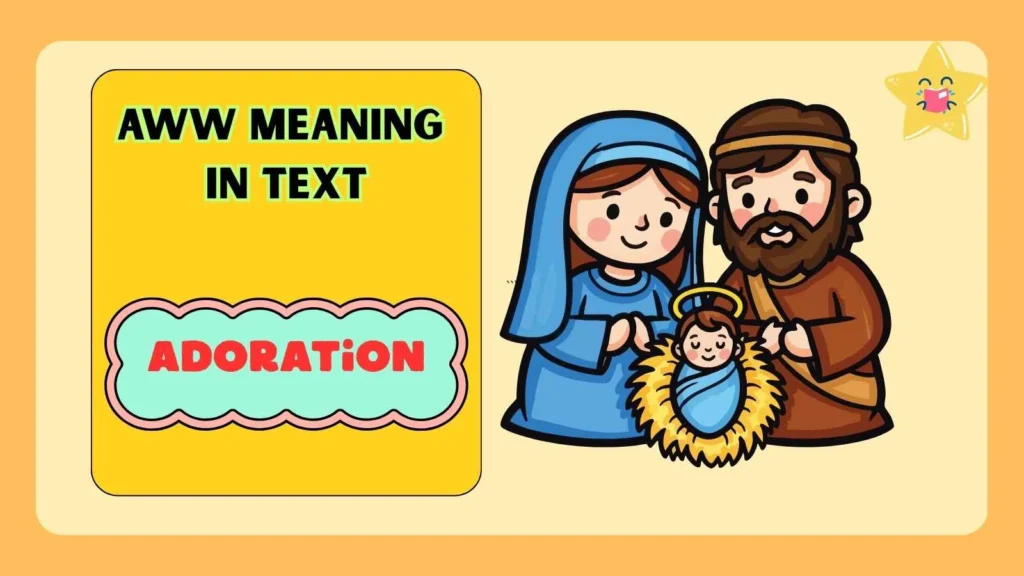The term aww meaning in text is widely searched because it frequently appears in online chats, social media comments, and messaging platforms. People encounter it when reacting to cute photos, heartwarming stories, or touching messages, and understanding its use helps decode modern digital communication.
In the fast-paced world of texting, short expressions like “aww” capture emotions instantly, saving time while conveying feelings effectively.
“Aww” is a versatile term that expresses warmth, affection, or empathy. Its widespread usage across platforms like Instagram, TikTok, Snapchat, and WhatsApp has made it a staple in informal communication.
This article explores the meaning, origin, and usage of “aww” in various contexts, clarifies misconceptions, and offers guidance on how to respond appropriately, ensuring you can communicate naturally in both casual chats and online communities.
Definition & Meaning
The most common interpretation of aww meaning in text is a verbal expression of adoration, sympathy, or delight. It’s an onomatopoeic term mimicking the soft sound someone makes when touched emotionally or impressed by something cute.
- Cute reactions: Responding to baby pictures, pets, or adorable content.
- Empathy: Showing concern when someone shares a touching story.
- Positive reinforcement: Complimenting or expressing approval subtly.
Unlike acronyms, “aww” is more of a sound representation than a formal abbreviation. Its simplicity allows it to convey genuine emotion in a single word.
Background & History
The use of “aww” predates texting. It originated in English as a spoken expression to convey emotion. Early literature and comics occasionally used it to depict tenderness or delight.
With the rise of digital messaging and social media, “aww” naturally transitioned into written form. Typing “aww” online provides the same emotional reaction as saying it aloud, making it a universal shorthand for showing feelings.
Its adoption across different platforms has cemented it as a common element of online culture.
Usage in Various Contexts
Casual Chats
Used when friends share cute images or stories:
- “Aww, that puppy is adorable!”
Social Media Comments
Often accompanies heart or emoji reactions:
- “Aww 🥰 this made my day!”
Empathetic Messaging
Expressing sympathy or kindness:
- “Aww, I’m so sorry to hear that.”
Gaming & Online Communities
Shows appreciation for creative content or funny moments:
- “Aww, that was clever!”
Common Misconceptions & Clarifications
- Not sarcastic by default: While “aww” can be used sarcastically, it usually expresses sincerity.
- Not formal language: It’s casual and best suited for informal settings.
- Not a code or acronym: Unlike “LOL” or “BRB,” it’s a simple expression of emotion.
Understanding tone and context is crucial for proper interpretation.
Similar Terms & Alternatives
Other ways to express similar feelings:
- “Cute!”
- “So sweet”
- “Adorable”
- “How precious”
- Emojis: 🥰, 🐶, ❤️
These can be used interchangeably depending on the platform and audience.
How to Respond to This Term
Responses should match the tone of the conversation:
- Agree or react with another expression: “I know, right? Aww 🥹”
- Add emojis to enhance emotion: 🐱❤️
- Share a similar moment or story: “Aww, I have a picture of my puppy too!”
Keeping responses light and positive works best in casual chats.
Regional or Cultural Differences
- Global recognition: Widely understood in English-speaking countries and on international social media.
- Cultural nuance: Some cultures might use local expressions for the same emotion, but “aww” is still easily recognized online.
- Digital communities: Universally popular in gaming, fandoms, and meme culture.
Comparison with Similar Terms
| Term | Meaning | Tone | Usage |
|---|---|---|---|
| Aww | Delight, affection | Casual, friendly | Chats, comments |
| Aw | Same as “aww” | Slightly informal | Texts, messaging |
| Cute! | Appreciation | Neutral | Comments, reactions |
| So sweet | Admiration, empathy | Positive | Conversations |
“Aww” remains one of the fastest ways to express warm feelings digitally.
Usage in Online Communities & Dating Apps
- Online forums: Users post “aww” when reacting to cute animals, fanart, or heartwarming stories.
- Dating apps: Express admiration or appreciation for a partner’s profile picture or message:
- “Aww, you have the cutest smile!”
Tone is important to avoid appearing sarcastic or disinterested.
Hidden or Offensive Meanings
- Typically harmless.
- Rarely, sarcasm can make “aww” appear dismissive or condescending.
- Mostly safe across all age groups and platforms.
Suitability for Professional Communication
- Not recommended in professional emails or formal chats.
- Instead, use polite phrases like:
- “That’s very thoughtful.”
- “I appreciate your kind gesture.”
In professional contexts, the casual tone of “aww” may seem unprofessional.
FAQs:
What does aww mean in texting?
It expresses delight, affection, or empathy.
Is aww slang or formal language?
It is casual and informal.
Can aww be used sarcastically?
Yes, depending on context and tone.
Is aww suitable for emails?
No, it’s best for informal chats.
Do teens use aww more than adults?
Yes, younger users often use it online.
How do I respond to aww in texts?
React with emojis, agree, or share a similar cute moment.
Conclusion:
The aww meaning in text is a simple, universal expression of warmth, delight, or empathy. It allows people to convey emotions quickly in casual chats, social media, and online communities.
While it’s informal, understanding its usage, context, and tone ensures you communicate affection or appreciation naturally and effectively.
Whether reacting to cute content, heartwarming stories, or playful messages, knowing how and when to use “aww” keeps your digital interactions friendly and engaging.
